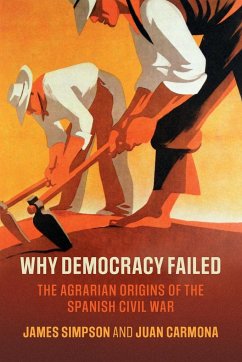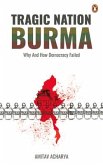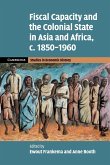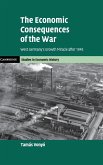James Simpson (Universidad Carlos III de Madrid), Juan Carmona (Universidad Carlos III de Madrid)
Why Democracy Failed
James Simpson (Universidad Carlos III de Madrid), Juan Carmona (Universidad Carlos III de Madrid)
Why Democracy Failed
- Broschiertes Buch
- Merkliste
- Auf die Merkliste
- Bewerten Bewerten
- Teilen
- Produkt teilen
- Produkterinnerung
- Produkterinnerung
This distinctive new history of the origins of the Spanish Civil War tackles the highly-debated issue of why it was that Spain's democratic Second Republic failed. James Simpson and Juan Carmona explore the interconnections between economic growth, state capacity, rural social mobility and the creation of mass competitive political parties.
Andere Kunden interessierten sich auch für
![Sovereignty without Power Sovereignty without Power]() Leigh A. Gardner (London School of Economics and Political Science)Sovereignty without Power92,99 €
Leigh A. Gardner (London School of Economics and Political Science)Sovereignty without Power92,99 €![Tragic Nation Burma: Why and How Democracy Failed Tragic Nation Burma: Why and How Democracy Failed]() Amitav AcharyaTragic Nation Burma: Why and How Democracy Failed15,99 €
Amitav AcharyaTragic Nation Burma: Why and How Democracy Failed15,99 €![Fiscal Capacity and the Colonial State in Asia and Africa, c. 1850-1960 Fiscal Capacity and the Colonial State in Asia and Africa, c. 1850-1960]() Fiscal Capacity and the Colonial State in Asia and Africa, c. 1850-196031,99 €
Fiscal Capacity and the Colonial State in Asia and Africa, c. 1850-196031,99 €![Maritime Metropolis Maritime Metropolis]() Sarah Palmer (University of Greenwich)Maritime Metropolis104,99 €
Sarah Palmer (University of Greenwich)Maritime Metropolis104,99 €![The Economic Consequences of the War The Economic Consequences of the War]() Tamas Vonyo (Milan Universita Commerciale Luigi Bocconi)The Economic Consequences of the War109,99 €
Tamas Vonyo (Milan Universita Commerciale Luigi Bocconi)The Economic Consequences of the War109,99 €![Sovereignty without Power Sovereignty without Power]() Leigh A. Gardner (London School of Economics and Political Science)Sovereignty without Power38,99 €
Leigh A. Gardner (London School of Economics and Political Science)Sovereignty without Power38,99 €![How Psychologists Failed How Psychologists Failed]() Fathali M. Moghaddam (Washington DC Georgetown University)How Psychologists Failed38,99 €
Fathali M. Moghaddam (Washington DC Georgetown University)How Psychologists Failed38,99 €-
-
-
This distinctive new history of the origins of the Spanish Civil War tackles the highly-debated issue of why it was that Spain's democratic Second Republic failed. James Simpson and Juan Carmona explore the interconnections between economic growth, state capacity, rural social mobility and the creation of mass competitive political parties.
Produktdetails
- Produktdetails
- Cambridge Studies in Economic History - Second Series
- Verlag: Cambridge University Press
- Seitenzahl: 318
- Erscheinungstermin: 25. Mai 2022
- Englisch
- Abmessung: 229mm x 152mm x 17mm
- Gewicht: 466g
- ISBN-13: 9781108720380
- ISBN-10: 1108720382
- Artikelnr.: 58853156
- Herstellerkennzeichnung
- Libri GmbH
- Europaallee 1
- 36244 Bad Hersfeld
- gpsr@libri.de
- Cambridge Studies in Economic History - Second Series
- Verlag: Cambridge University Press
- Seitenzahl: 318
- Erscheinungstermin: 25. Mai 2022
- Englisch
- Abmessung: 229mm x 152mm x 17mm
- Gewicht: 466g
- ISBN-13: 9781108720380
- ISBN-10: 1108720382
- Artikelnr.: 58853156
- Herstellerkennzeichnung
- Libri GmbH
- Europaallee 1
- 36244 Bad Hersfeld
- gpsr@libri.de
Growing up in the aftermath of the Video Nasties, during the late eighties and early nineties, James Simpson is from a small town in the North East of England where talking about grisly horror flicks was the norm in his school playground. For the last few years, he has written about cult cinema for several magazines and websites as well as running his own-now-defunct site: Infernal Cinema. He has interviewed horror stars Emily Booth, Barbie Wilde, and the legendary Lloyd Kaufman, amongst others, during this time. He appears in the Jason Impey documentary: VIPCO: The Untold Story. This is his first book. His favourite VIPCO movie is Spookies.
Introduction; Part I. The European Experience: Economic and Political
Development, 1870-1939: 1. The modernization of European societies; 2.
European agriculture in an age of economic instability; Part II. Spanish
Agriculture, Economic Development and Democracy: 3. The limits to Spanish
modernization, 1850-1936; 4. Agricultural growth, regional diversity, and
regional land-tenure regimes; Part III. Explaining the Weakness of the
Family Farm: 5. The family farm and the limits to village - level
cooperation; 6. The persistence of the landed elites and the nature of farm
lobbies; Part IV. Rural Elites, Poverty, and the Attempts at Land Reform:
7. Land ownership, economic development and poverty in Andalusia and
southern Spain; 8. The limits to land reform; Part V. Rural Conflicts and
the Polarization of Village Society: 9. Creating parties, political
alliances, and interest groups: rural politics in the 1930s; 10. The
growing polarization of rural society during the Second Republic;
Conclusion; Appendix 1. Agricultural statistics in Spain, France and Italy
in the early 1930s; Appendix 2. Dry-farming and the economics of the family
farm.
Development, 1870-1939: 1. The modernization of European societies; 2.
European agriculture in an age of economic instability; Part II. Spanish
Agriculture, Economic Development and Democracy: 3. The limits to Spanish
modernization, 1850-1936; 4. Agricultural growth, regional diversity, and
regional land-tenure regimes; Part III. Explaining the Weakness of the
Family Farm: 5. The family farm and the limits to village - level
cooperation; 6. The persistence of the landed elites and the nature of farm
lobbies; Part IV. Rural Elites, Poverty, and the Attempts at Land Reform:
7. Land ownership, economic development and poverty in Andalusia and
southern Spain; 8. The limits to land reform; Part V. Rural Conflicts and
the Polarization of Village Society: 9. Creating parties, political
alliances, and interest groups: rural politics in the 1930s; 10. The
growing polarization of rural society during the Second Republic;
Conclusion; Appendix 1. Agricultural statistics in Spain, France and Italy
in the early 1930s; Appendix 2. Dry-farming and the economics of the family
farm.
Introduction; Part I. The European Experience: Economic and Political
Development, 1870-1939: 1. The modernization of European societies; 2.
European agriculture in an age of economic instability; Part II. Spanish
Agriculture, Economic Development and Democracy: 3. The limits to Spanish
modernization, 1850-1936; 4. Agricultural growth, regional diversity, and
regional land-tenure regimes; Part III. Explaining the Weakness of the
Family Farm: 5. The family farm and the limits to village - level
cooperation; 6. The persistence of the landed elites and the nature of farm
lobbies; Part IV. Rural Elites, Poverty, and the Attempts at Land Reform:
7. Land ownership, economic development and poverty in Andalusia and
southern Spain; 8. The limits to land reform; Part V. Rural Conflicts and
the Polarization of Village Society: 9. Creating parties, political
alliances, and interest groups: rural politics in the 1930s; 10. The
growing polarization of rural society during the Second Republic;
Conclusion; Appendix 1. Agricultural statistics in Spain, France and Italy
in the early 1930s; Appendix 2. Dry-farming and the economics of the family
farm.
Development, 1870-1939: 1. The modernization of European societies; 2.
European agriculture in an age of economic instability; Part II. Spanish
Agriculture, Economic Development and Democracy: 3. The limits to Spanish
modernization, 1850-1936; 4. Agricultural growth, regional diversity, and
regional land-tenure regimes; Part III. Explaining the Weakness of the
Family Farm: 5. The family farm and the limits to village - level
cooperation; 6. The persistence of the landed elites and the nature of farm
lobbies; Part IV. Rural Elites, Poverty, and the Attempts at Land Reform:
7. Land ownership, economic development and poverty in Andalusia and
southern Spain; 8. The limits to land reform; Part V. Rural Conflicts and
the Polarization of Village Society: 9. Creating parties, political
alliances, and interest groups: rural politics in the 1930s; 10. The
growing polarization of rural society during the Second Republic;
Conclusion; Appendix 1. Agricultural statistics in Spain, France and Italy
in the early 1930s; Appendix 2. Dry-farming and the economics of the family
farm.









